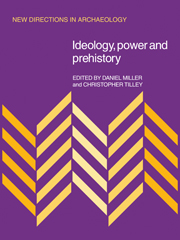9 - Ideology, power and long-term social change
Published online by Cambridge University Press: 05 March 2012
Summary
Ideology, power and long-term social change
The introduction attempted to provide a background to the ideas and approaches that have been used in this volume. In this conclusion we wish to point out some of the ways in which the application of these approaches appears to present promising possibilities for the future, and also to deal more explicitly with the relationship between them and the study of prehistoric materials. The focus of this volume has been on diachronic analysis. Only the paper by Welbourn is synchronically conceived. Of the other papers in Part two, the periods under study, roughly half a century for Leone, and a century for Miller, may seem relatively short but these are periods of rapid and considerable change. The case studies of Part three are based on periods of around one millennium. This is a particular feature of archaeological synthesis and indeed one millennium is not an unduly long period by the standards of the discipline. Such a scope necessitates consideration of factors not generally encountered in other areas of the social sciences.
For many archaeologists it has been precisely this long time-span that has been used to legitimate analyses founded on relatively mechanical and deterministic perspectives. The case studies presented here indicate that this need not be an inevitable result of archaeological analyses. Throughout the volume there is an emphasis on change as being predicated on a consideration of social factors inextricably linked with the form and nature of social totalities postulated for the segment of the past under consideration.
- Type
- Chapter
- Information
- Ideology, Power and Prehistory , pp. 147 - 152Publisher: Cambridge University PressPrint publication year: 1984
- 8
- Cited by



